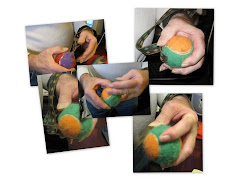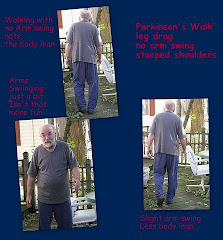We haven't talked from personal experience about levodopa-carbidopa (Sinemet) as a symptom relief treatment for Parkinson's disease. About 8 weeks ago Steve began taking levodopa-carbidopa. He is actually on a fairly low dose which seems to help a great deal with stiffness, a bit with tremor and not so much with weakness but he still hasn't titrated up to the full prescribed dosage - we're on hold for a totally different reason because we don't want to.
It was his idea to take levodopa-carbidopa and his neurologist agreed to write the prescription. He has not reached the point where he needs a higher dose to be effective and so he has no reason to take the controlled release (CR) form for a steady, continuous delivery. And because the first morning dose of the timed-release pills may actually take much longer to start working, we hope that we will be able to control the stiffness with the generic version.
- Sinemet tablet 12.5/100 mg
- Sinemet CR tablet 50/200 mg
- Sinemet Plus tablet 25/100 mg
The product distributor, Bristol-Myers Squibb indicated in an August announcement that there were packaging issues which would cause a three week delay.
Also announcing a shortage was Apotex, Inc for the generic Apo-Levocarb CR (200/50) available in Canada but now discontinued. Patients are encouraged to consult their doctors for treatment alternatives. Bristol-Myer Squibb is the distributor for Merck, supplying to Apotex. When announcing in Canada, no reason was provided, however other reports suggest that consumer stock-piling was already in progress creating a short supply.
The good news is that many generic versions, usually slightly weaker, still appear to be readily available, so it is not time to panic if you are using the medication for Parkinson's disease, parkinsonism, encephalitis caused parkinsonian symptoms, carbon monoxide or manganese poisoning. Just how long this will last is unknown.
People who are already taking Sinemet CR, Sinemet Plus of Sinemet 12.5/100 and are concerned about not being able to renew a prescription can call one of several numbers worldwide to speak to the customer relations department at Bristol-Myers Squibb Pharmaceuticals Ltd (800) 332-2056 or at Merck Sharp & Dohme Ltd or the parent company Merck & Co, Inc.
The following countries have offices which you can contact at the Merck links above:
Thus far we have not seen warning for the other L-dopa/carbidopa combination medications.
- You can not split a timed release tablet
- You could have a withdrawal problem if you simply stop taking the medication; consult your physician about a lower dosage prescription in order to titrate down.
~ ~ ~ ~ ~ ~ ~ ~ ~ ~ ~
Addendum
Per information from the American Society of Health-System Pharmacists"
Back on February 23, 2010, GlaxoSmithKline (GSK) had acquired Reliant and announced that DynaCirc CR had been unavailable during the transition period. The 5mg and 10mg pills are available now.
Activis Group did make some changes in isradipine packaging. The 2.5 mg 100 count package is no loonger but the 60 count is available to pharmacies. The same is true of the 100 count 5mg package. Now only 60 count packages are available.
Watson Pharmaceuticals, which was formerly Cobalt, has isradipine available in 2.5 mg and 5 mg 100 capsule counts.
For those who have been taking the CCB Nimodipine, that shortage has been resolved.


















Lego my eggo. OK, I guess I'll have to switch to Pop Tarts...wish it were that easy for the other shortages mentioned. However, I can say that in a recent email exchange I had with the Kellogg people regarding the manufacturing locations of Pop Tarts, good luck getting info out of the drug companies.
ReplyDeleteVan's makes a terrific no-gluten frozen waffle. Try them...if you can find them; they're good.
ReplyDeleteThe concern we have is the WHY of the sinemet shortage.
What is the reason for the shortage?
ReplyDeleteHow many millions of people are affected by this?
Since the job of merck sharp & dohme is to supply this drug, they have failed in their main task. But no explanation is given.
Increasing the money received by this action is, of course nothing to do with this shortage.
I think that part of the answer may lie in a recent post:
ReplyDeletehttp://parkinsonsfocustoday.blogspot.com/2010/05/how-much-antifreeze-does-parkinsons.html
The idea of creating a better duration release form of levodopa-carbidopa would mean fewer
'off' times.
Another possible explanation may be found in the following quote from 2 years ago:
'The Parkinson's disease market is approaching maturity, with the threat of generic incursion evident in each drug class. Although growth will be stifled by generic launches, relatively successful lifecycle management strategies and new product launches see the Parkinson's disease market grow at a compound annual growth rate (CAGR) of 2.6% over the next 10 years.'
I admit that although I would like to think positively, my first reaction was that reformulation would mean that the generics would be knocked out of the playing field for several years and big pharma would be back in full swing.
Make no mistake - and I'm sure you don't - the task of any company with the exception of a very few, their primary job is to make money for their shareholders. That's bu$ine$$.
A big hitch in this kind of plan is that there are more unemployed PwPs worldwide. And these people need generics.
We may see an increase in mucuna puriens powder in a standardized form - in capsules - or in DIY kits with the empty capsules and a supply of the powder.
But there is always the possibility that there will be improvements during this reformulation process and that the patient will ultimately benefit.
Don't forget the extraordinary cost of developing a drug that reaches the market. Getting to the point where an actual profit is returned can take some time.
Merck said: "This temporary shortage is related to a change in the source of supply for the drug and the necessary timelines needed to obtain regulatory approvals for this supply change. It is important to note that this situation is not due to product quality or safety issues, nor is it due to delays on the part of individual regulatory agencies that approve this supply change"
I've read it several times, I know the meaning of every word, but I haven't been able to translate it into clarity.
Merck added further 'reassurances' by stating:
'To address the expected shortfall, Merck & Co., Inc. (Merck), the parent company, and MSD are taking action to manage available supply of these products through a process that primarily takes into account patient needs, as well as availability of alternative treatments (which exist in most markets), and contractual obligations. In accordance with analysis carried out by Merck, some markets will get their full needs met, many will experience a significant shortfall in their supply, and many will not get any supply of these products.'
Parkinson's disease, more than many diseases, offers a wealth, if you will, of pharmaceutial opportunity.